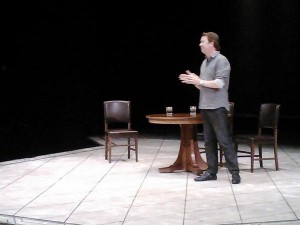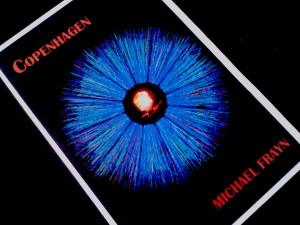The AxS Festival, in coordination with A Noise Within, presented a staged reading of playwright Michael Frayn’s Tony Award-winning play Copenhagen on September 29, 2014. In it, Neils Bohr, his wife Margrethe, and Bohr’s protégé Werner Heisenberg are condemned to recount the events of one day in 1941 standing in the purgatory of director Robertson Dean’s barren stage. Featuring friend of the Scirens and CalTech theoretical physicist Sean Carroll as the pre-show speaker!

What is something new that you learned?
I learned that the playwright who brought us the rollicking farce Noises Off (which has an entire act dedicated to a dumb show told exclusively in stage directions) wrote a play about physics, philosophy, and ethics without a single stage direction to be found. How wonderful to see the plasticity and curiosity of Michael Frayn’s mind. He, according to the experts in my life, also is credited as the best translator of Chekhov’s plays, so it’s no surprise that this polymath would tackle the Heisenberg/Bohr dilemma in Copenhagen.
What story did you encounter that captured your imagination?
The character I was most fascinated with was Margrethe–wife of and confidante to Niels Bohr. As the only woman in the play, she functions as a moral compass for these two men who can’t quite wrap their minds around the destruction that would soon be wrought from their scientific advancements. Analogous to the impending atomic bomb, the death of the oldest Bohr son weighs heavily on all three characters, but Margrethe feels it the deepest. His death and the fallout it creates serve as foreshadowing to the agony suffered by everyone in the war, but potentially more so for Bohr (if his work on the Manhattan Project did indeed make it into the plans for the bomb). Heisenberg’s guilt and shame is more personal–a near death encounter with an SS officer and a incident where he’s charged with watching over (and perhaps executing?) another man. Margrethe’s pain and strength, though, is universal. She is all mothers. She is everyone who has ever suffered loss. She must endure both men’s memories with them and for them, and she must comfort them when they can bear the agony no longer.
What question did you leave with? What do you now want to know about or explore further?
I know very little about Heisenberg’s work for the German government during the war, so I’d like to read more about it. It’s hard to imagine how tiny the international physics community was in the mid-twentieth century. To think that this war divided an already small group of people dedicated to a better understanding of the universe around us astounds me.
What challenged you during the event? [either frustrated you, something you wanted more of/less of, etc]
The play is verbally very dense, and with the spartan set and costume design of this production, we theatre patrons had to put on our listening caps and hang on for the ride. I would love to see this play again after consuming a full carafe of coffee (with ample time, of course, to visit the loo). Taryn and I both remarked that we’d love to get a hard copy of the play to read. There were so many beautiful and poetic moments in the play, but the pace was so rapid, I found it difficult to commit anything to memory. And I just can’t bring myself to take notes while I’m sitting in a theatre.
 If there were a part of the show that you could bring to life around you, what would it be? (the Mary Poppins “jump into the sidewalk chalk picture” question)
If there were a part of the show that you could bring to life around you, what would it be? (the Mary Poppins “jump into the sidewalk chalk picture” question)
I don’t know if I would willingly put myself in such a difficult position! I think I’d prefer to live in blissful ignorance. There are challenges in life where it’s emotionally safer to not know the full story than it is to understand the problem at hand and feel helpless to do anything to change it. The Bohrs and Heisenberg know too much, and even after death they mull over the events, wondering if there were anything they could have done to alter history. But the arrow of time only moves in one direction, as our illustrious pre-show lecturer Sean Carroll would surely remind us. You cannot change the past; you can only hope to understand it better with each passing day.
Write a headline for your experience today.
Copenhagen Syndrome–Falling in Love with Physics and Theatre
If you could have brought someone, living or dead, to the event with you today, who would it be and why?
Lucky me, the three people I would most want to see this play with were in the theatre that very night! My other half Brad, my dear friend and science writer Jennifer Ouelette, and my friend and physics superstar Sean Carroll were all there. I cannot imagine three better people to enjoy the art of Frayn’s creation and the elegance of the physics behind it.
How do you imagine this experience would be 20 years in the future?
I hope very nearly the same! What I love about theatre is its immediacy. I hope that 20 years from now (if I’m not playing Margrethe myself) that I would be watching three fantastic actors 20 feet from me, devouring and espousing Frayn’s prose in the same ancient tradition that has held humans captive for the past 2500 years.
